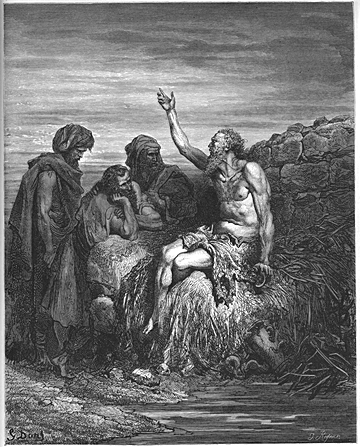Job 2
1 On another day, the angels came again and gathered together in front of Yahweh, and Satan came too.
Pea naʻe toe ai ʻae ʻaho naʻe fakataha ai ʻae ngaahi foha ʻoe ʻOtua ke fakahā ʻakinautolu ʻi he ʻao ʻo Sihova, pea naʻe haʻu ai foki ʻa Sētane mo kinautolu ke fakahā ia ʻi he ʻao ʻo Sihova.
2 Yahweh asked Satan, “Where have you come from?” Satan replied, “I have come from the earth, where I have been traveling back and forth, seeing what is happening.”
Pea pehē ʻe Sihova kia Sētane, “Kuo ke haʻu mei fē?” Pea tali ʻe Sētane kia Sihova, ʻo pehē, “Mei heʻeku fakatakamilo ʻa māmani, mo ʻeku feʻaluʻaki fano ʻi ai.”
3 Yahweh asked Satan, “Have you (noticed/thought about) my [faithful] servant Job? He is very godly/righteous [DOU], he greatly respects/reveres me, and he [always] avoids doing evil things. And he still acts in a very godly/righteous manner, even though you persuaded me to [let you] cause disastrous things to happen to him for no reason.”
Pea naʻe pehē ʻe Sihova kia Sētane, “Kuo ke tokangaʻi ʻa ʻeku tamaioʻeiki ko Siope, he ʻoku ʻikai hano tatau ʻi māmani, ko e tangata haohaoa mo angatonu, ʻoku manavahē ia ki he ʻOtua, pea afe mei he kovi? Pea ʻoku ne kei kuku maʻu pe ʻene angatonu, ka naʻa ke ueʻi au ki ai, ke fakaʻauha ia taʻehanoʻuhinga.”
4 Satan replied to Yahweh, “He praises you only because you bless him [IDM]. People will give up everything they have to save their own lives.
Pea naʻe tali ʻe Sētane kia Sihova, ʻo pehē, “Ko e kili maʻa e kili, ʻio, ʻe foaki ʻe he tangata ʻene meʻa kotoa pē ke ne moʻui ai.
5 But if you harm his body [MTY], he will surely curse you openly [IDM]!”
Kae mafao atu eni ho nima, ʻo ala ki hono hui mo hono kakano, pea te ne lauʻikoviʻi koe ʻi ho fofonga.”
6 Yahweh replied to Satan, “(All right/Okay), you may do to him whatever you want to do, but do not cause him to die.”
Pea naʻe pehē ʻe Sihova kia Sētane, “Vakai, ʻoku ʻi ho nima ia; ka ko ʻene moʻui pe ʻe tapu.”
7 So Satan left, and he caused Job to be afflicted with very painful boils, from the top of his head to the soles of his feet.
Pea ʻalu ai ʻa Sētane mei he ʻao ʻo Sihova, ʻo ne taaʻi ʻaki ʻa Siope ʻae ngaahi hangatāmaki mamahi, ʻo fai mei hono ʻaofi vaʻe ʻo aʻu ki hono tumuʻaki.
8 Job took a piece of broken pottery and scraped the boils on his skin, and he sat in ashes [as people did when they were mourning for those who had died].
Pea ne toʻo ʻe ia ʻae konga ipu maumau ʻo teletele ʻaki ia; pea tangutu ia ʻi he efuefu.
9 His wife said to him, “Are you still trying to (be loyal to/faithfully trust in) God? You should curse God, and then you will die.”
Pea pehē ai ʻe hono uaifi kiate ia, “ʻOku ke kei kuku hoʻo angatonu? Lea kovi ki he ʻOtua, ka ke mate.”
10 But Job replied, “You talk like people who do not know God talk. (Should we accept only the good things that God [does for us]?/We should not accept only the good things that God [does for us].) [RHQ] We should also accept bad things.” So in spite of all these [things that happened to] Job, [he] did not say anything against God.
Ka naʻe pehē ʻe ia ki ai, “Ko hoʻo lea ʻoku hangē ko e lea ʻa ha taha ʻi he kau fefine vale. ʻIo! he te tau maʻu koā ʻae lelei mei he nima ʻoe ʻOtua, pea ʻikai te tau maʻu mo e kovi?” ʻI he ngaahi meʻa ni kotoa pē naʻe ʻikai angahala ʻa Siope ʻi hono loungutu.
11 Among Job’s friends were Eliphaz from Teman [town], Bildad from Shuah [land] and Zophar from Naamah [land]. When they heard about all the terrible things that had happened to Job, they left their home areas and went together to Job to console/comfort him [DOU].
Pea ʻi he fanongo ʻae kāinga ʻe toko tolu ʻo Siope ki he kovi ni kotoa pē kuo tō kiate ia, naʻa nau haʻu mei honau potu taki taha; ko Elifasi mei Timani, mo Pilitati mei Suaa, mo Sofaa mei Neama: he kuo nau tālanga ke nau fakataha ke nau mamahi mo ia mo nau fakafiemālieʻi ia.
12 When they saw Job from a distance, they almost did not recognize him. They wailed loudly, they tore their robes, and they threw dust over their heads [to show how sorry they were because of what had happened to Job].
Pea ʻi heʻenau hanga hake kiate ia mei he mamaʻo, ʻo ʻikai ʻilo ia, naʻa nau tangi leʻo lahi; pea naʻa nau taki taha haehae hono pulupulu, mo lī ʻae efu ki ʻolunga ki honau ʻulu.
13 Then they sat on the ground with Job for seven days. None of them said anything to Job, because they saw that he was suffering greatly, [and they did not think that anything that they said would lessen his pain].
Pea naʻa nau nonofo mo ia ʻi he kelekele ʻi he ʻaho ʻe fitu mo e pō ʻe fitu, pea naʻe ʻikai siʻi lea ha taha ki ai: he naʻa nau vakai kuo lahi ʻaupito ʻene mamahi.





















